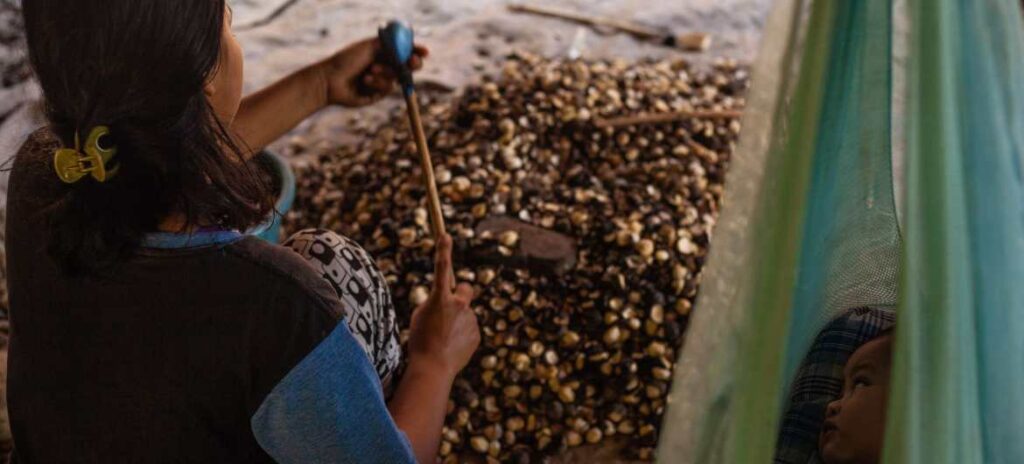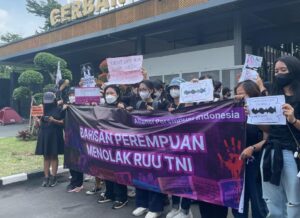
West Sulawesi is the province with the highest child marriage rate in Indonesia. Many teenage girls bear the dual burden of
being a wife and mother.
Ilna, 15 years old, looked solemn when she remembered the birth-giving process of her only child. She looked down for a moment, then made a short comment; “very painful,” she said. Not a month ago this young girl experienced a normal childbirth, which took place at home with the help of village midwives. Although she had to fight the pain, Ilna was grateful that her child was born healthy and weighing 3.1 kilograms.
Ilna was hugging the 18-day-old baby when we visited her house in Sepang hamlet, Karampuang island, West Sulawesi, on Monday 11/2/2019. Ilna admitted that she was only 14 years old when she was married to Firman Gunawan (28 years old). They got to know each other through Facebook, and often exchanged messages. Firman, who is an event photographer, also often
visited her home.
After a couple of months of meeting in this way, Firman proposed to Ilna and she accepted because she loved him. She quit school to build a family “because I loved him and I did not want to go to school anymore,” Ilna said. Her economic background was also a reason for Ilna’s decision. Her parents were divorced and she was living with her mother who is a domestic assistant. Two of her siblings were not able to make a living, and Ilna hoped that her marriage would ease the burden for the family.
A different story was told by Ninda, 19 years old, Ilna’s neighbour. Ninda was married at a reasonable age, but her husband, Irham was only 15 years old. They were also cousins. Now Ninda has been pregnant for two months. Strangely, in the past month, Irham has not been seen, even though Ninda’s condition is concerning. “I suffered bleeding last week, but I was grateful for the midwife’s help,” she sighed.
Child marriage is very common among families on Karampuang island. The island, with an area of 2.302 square hectares, is close to Mamuju, capital city of West Sulawesi, with travel time less than 30 minutes by motor boat. We visited there to bserve the life of young couples. Similar phenomena can be observed in Kalukku subdistrict, about 37 kilometres from Mamuju.
On Tuesday (12/2/2019) we spoke with Husnawati in Pokkang village, Kalukku subdistrict, Mamuju. At that time, Husnawati was working under her house built on stilts, peeling candlenuts for the village head to earn Rp1,000 per kilogram.
Husnawati was doing this work while caring for her child; the four-month-old baby was asleep on a swing hanging under the house. Husnawati cradled her child and hummed lullabies. Her husband, Rudi, was helping his family plant corn. He works as a construction labourer, but in the last two months there has been no work, so he has been relying on odd jobs.
The couple made a marriage covenant in 2017 when Husnawati was still 15 years old and a student of secondary high school, and Rudi was 22 years old. They were in love and eloped to get married. “Yes, we felt we had to get married,” Husnawati said, explaining their reason for getting married.
The family took a shortcut to deal with the fact that Husnawati’s age did not meet the requirements for marriage. They marked up Husnawati’s age to 16 years old. Her mother Marlina (41 years old), claimed that she had to spend Rp1 million to complete administrative matters at the Religious Court. A shortcut, Husnawati said, needed to be taken so that her child could get a birth certificate.
There are many young couples in West Sulawesi who were married in religious ceremonies, without state recognition. The stories of Ilna and Firman, and Ninda and Irham, presented at the beginning of this article, are real examples.
***

Law no. 1/1974 on Marriage has set the marriage age requirement at 19 and 16 years, for boys and girls respectively.
In December 2018, the Constitutional Court concluded that the law was in conflict with the law of 1945. The Court recommended a rule change within three years. Many parties suggested 18 years old as the age requirement for girls. West Sulawesi is recorded as the province with the highest prevalence of child marriage in Indonesia, as stated in the document entitled Analisis Data Perkawinan Usia Anak di Indonesia (Analysis of the Age of Children at Marriage in Indonesia; UNICEF, 2015).
Data analysis for the 2008-2012 period mentioned that the prevalence of child marriage in West Sulawesi reached 37 percent, far above the national average of only 25 percent. An update released by the Central Statistics Agency (BPS), revealed the age of women in West Sulawesi when they first married. The data showed that the percentage of girls who married under the age of 18 years old reached 33.02 percent.
Susenas (Survei Sosial Ekonomi Nasional) BPS tabulation (2018) presents the total number of married members of the population in the age range of 10-18 years old from six regencies in West Sulawesi. Of serious concern is the fact that marriages of 10-15 year olds can be found in Polewali Mandar (228 persons) and Mamuju Tengah (205 persons).
These statistics are even more alarming when considering the risks of child marriage summarised by “Girls Not Brides,” an anti child-marriage coalition of more than 1,000 civil organisations from 95 countries. “Girls Not Brides” mentioned that child marriage is a violation of the freedom of girls. Generally, they lose basic rights, especially as related to education and health.
Girls are considered to have no physical and emotional abilities as pertaining to skills required for the roles of mother and wife. This situation could trigger violence in the household and divorce. Concerning health, it may endanger pregnancy and childbirth.
Mulyani Hasan, an activist of Rumah Kita Bersama (Rumah KitaB), likened child marriage to an iceberg. “The root of the problem is not visible or measurable,” she said, during a forum of child marriage in Makassar, South Sulawesi (12/14/2018). Mulyani also addressed gender perspective in the child marriage. She said the gender gap results in girls being perceived as an economic burden. In that situation, parents see marriage as a solution to ease the burden. “In addition, there are customs, traditions, social ties, kinship, and interpretations of religion promoting child marriage,” Mulyani said.
***

We spoke with Abdul Khalid Rasyid, Head of Office of Religious Affairs, Campalagian subdistrict, Polewali Mandar regency (8/2/2019). Khalid admitted that he married children of school age. “Each month there is such a case. Today, another couple, the file just came in,” he said. The function of the Office of Religious Affairs, Khalid said, is simply to record the administration of marriage. However, before the registration, an underage couple must obtain a marriage dispensation from the Religious Court. The requirements are needed for couples blocked by the law.
In the Religious Court, most couples who submitted a marriage dispensation admitted that they were expecting a baby. Inevitably, the dispensation was issued. As an example, the Mamuju regency Religious Court has issued 13 marriage dispensations during the last year. “Both families came to testify, as required,” said Muhammad Fauzan, Junior Legal Registrar of Mamuju regency Religious Court.
The problem is that pregnancy stories are not always to be believed. Recognition of a fictitious pregnancy was told by Rahma (52 years old) in Majene regency (10/2/2019).
Rahma is father of Rusli (16 years old), who two months earlier had married Nanda Putri (15 years old). Both children were still secondary high school students. Rahma had no choice, because Rusli and Nanda had admitted to having engaged in sexual intercourse, even though Nanda was not pregnant, and after all, the girl’s family asked for accountability. As a result, they agreed to compose a story about Nanda’s pregnancy before the Religious Court. In fact, Rahma said, so far his daughter-in-law is still not pregnant.
Such a situation cannot be considered without also taking into account the cultural background. Mandar, the ethnic majority in West Sulawesi, knows the term ottong which literally means piercings. In practice, ottong allows women or other family members to come to (ask for accountability) of male family members if they feel they have been touched or even just teased while walking.
This cultural case also underlies the marriage of Nurlina (17 years old) and Muhammad Irfan (23 years old). We met the couple at Dusun Lombok, Tinambung, Polewali Mandar regency (8/2/2019). They got married on 1 May 2017. Their first child, Aulia, born on 14 February 2018 was only one year old when Nurlina was six months pregnant with her second child. Nurlina admitted to feeling a little dizzy when chatting. Two patches were attached to her forehead, and Aulia fell asleep in her arms while hugging a toy puppy.
In the early days of her marriage, Nurlina admitted to feeling jealous when her friends of her own age were free to play. However, she has a determined nature and marriage was her own choice. “I was afraid to go home. It was better to get married,” she said, recalling the choices she had made two years earlier.
At that time Nurlina was dating Irfan. Once they had stayed out until midnight and Nurlina, fearing that both her parents would be angry with her, chose to stay overnight with Irfan’s family. The next day, when she returned home, her parents immediately began to discuss the issue of marriage. Ottong was not spared.
Although love and support led her to marriage, Nurlina did not want a similar situation for her own child. “Just don’t let my child experience this,” she said in a high-pitched voice. Instantly her arms tightened around Aulia and her eyes became teary.







